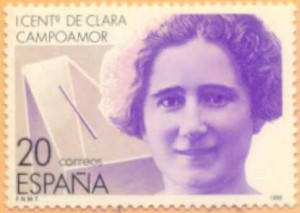Last Tuesday, 8 March, was
International Women's Day (Dia Internacional de la Mujer). Unless you never turn on the TV or read a newspaper, it would have been hard to miss. Daniel Craig, aka 007, donned a frock, high heels and a pretty blonde wig to star in
an ad about sexual equality narrated by his on-screen boss, M (Judi Dench). It was highly effective - alarming statistics about the prejudice (salary and career prospects) faced by women at work, for example. Internationally.
Spanish TV channel RTVE1 joined in with a week of programmes dedicated to women, one of which was last night's fascinating biopic about suffragrette Clara Campoamor (fab surname, means "love field"). She single-handledly ensured that the second republic's constitution, written in 1933, included the right of women to have the vote. At the time, 80 per cent of women in Spain were illiterate.
The film was subtitled
La Mujer Olvidada, The Forgotten Woman, which seemed an amazing epithet for someone who played such a crucial role in standing up for women's democratic rights. So why isn't she celebrated like Britain's Emmeline Pankhurst (a friend of mine's named after her)?
Clara came from a modest background, leaving school at 13 to work as a seamstress. She continued to study while teaching and then working for a liberal newspaper, before finally going to law school in Madrid in her 30s.
Elected to the Consituent Assembly in 1931 (by men; women couldn't vote), she faced an uphill struggle, one of only two women (the other was Victoria Kent, who refused to support her battle for equality; there's a park named after Ms Kent in my husband's
pueblo and I've always been curious about who she was. Despite the name, she was Spanish). Conservatives, catholics, and even other socialists opposed Clara, and eventually she left her own party, campaigning for suffrage as an independent member of the assembly. When the new constitution of the Second Republic was drafted, she ensured the inclusion of a clause guaranteeing equal legal status for men and women (though this was to be delayed by nearly 50 years, with the arrival of Franco's dictatorship).
If we think women have a hard time of it today in the workplace, standing up for their rights, imagine how it was for her - the only female in a chamber of cigar-smoking, (mostly) patronising men. She probably scared the living daylights out of them - at that time, a woman's place was in the home.
Her outspokenness cost her her seat in the assembly in the 1933 election. After holding a government job, she emigrated to Switzerland at the beginning of the Civil War, where she spent the rest of her life.
I don't have much time to read books, and even less in Spanish (magazine or newspaper articles are fine, anything longer and my attention wanes). So learning about such an important chapter in Spanish history - even if I can't vote in Spanish elections, my daughter will be able to - told clearly and entertainingly - was a real bonus.


